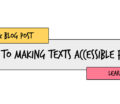
Engaging English Learners (ELs) in Academic Conversations
Imagine this scene… your students are in small groups using images from a story that you recently read to discuss the story’s themes. As you kneel down to listen in on one group’s conversation, you overhear one of your quieter English learners say to her classmate, “Could you share an example from the story to support your idea?”
A scene such as the one described above highlights the benefits of building ELs’ capabilities to engage in academic conversations. A synthesis of research on strategies to support ELs’ academic achievement identifies the importance of peer-to-peer learning opportunities that include peer discussions about academic content (August, 2018). Such peer-to-peer discussions promote language and literacy development and also serve as a powerful tool for learning and remembering content (Walqui & Heritage, 2018; Zwiers & Crawford, 2011).
However, despite the proven benefits of academic conversations, many ELs are still provided insufficient opportunities to engage in these types of oral language activities and often remain largely silent during instruction. In order to increase your ELs’ participation in academic conversations, we propose four practices that will foster greater EL engagement (Staehr Fenner & Snyder, 2017). We describe each one below and provide examples.
Four Practices for Fostering ELs’ Oral Language Development
1. Come to the discussion prepared. If we want ELs to participate in academic conversations, we must be sure that they are sufficiently prepared to take part. This means that they have knowledge of and support with the language needed for the discussion as well as understanding of the content being discussed. Some strategies to support this practice are to:
- Pre-teach and provide guided practice with needed vocabulary,
- Provide sufficient thinking and writing time, and
- Use scaffolded graphic organizers to support ELs’ sharing of ideas.
2. Use appropriate body language. In addition to providing support with the content and language needed during oral language activities, we also need to teach ELs what it looks like to engage in academic conversations (e.g., making eye contact, leaning in, nodding understanding). In order to support ELs with this practice:
- Be open about differences in cultural norms related to body language,
- Use role plays to demonstrate appropriate and inappropriate body language, and
- Make use of appropriate body language a part of student learning goals.

3. Participate by taking turns. A challenge of any group activity can be that a couple of students might do the majority of the speaking or the work. How then can we make sure that our ELs are playing an equal role? We suggest you:
- Create a communication culture that values the sharing of diverse ideas,
- Use gap activities where students have different pieces of information that they need to share with one another to complete the task, and
- Teach and model language for inviting classmates to participate.
4. Make connections. With every academic conversation, we want to make sure our ELs are not only sharing their ideas but are also making connections to what their peers are saying, to prior learning, and to their life experiences. In order to build this important skill, you can:
- Explicitly model how to make connections,
- Teach language that students can use in to connect ideas (e.g., I want to add on to what Joaquin said…).
- Practice discrete conversation skills (e.g., agreeing, disagreeing) through mini-lessons on familiar topics.
Final Thoughts
These four practices are just a starting point for building ELs’ oral language use. We’d love to hear from you about strategies you’re using to foster academic conversations with ELs in your classrooms. To continue the conversation and hear how nationally recognized ESL teacher Emily Francis engages her ELs in academic talk, please join us for our upcoming webinar, Supporting ELs’ Oral Language Development Through Academic Conversations on Thursday, February 21st.


